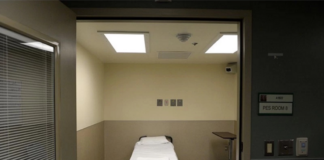Tag: involuntary commitment
Psych Ward Ramblings
In this piece for Medium, activist and survivor Louisa J. Harvey describes the experience of being locked in a psychiatric institution on an involuntary hold.
"This is not...
Opioid Bill Includes Involuntary Commitment
From EDS and Chronic Pain News & Info: Recent legislation has proposed measures that permit people to be involuntarily committed on the basis of perceived...
Reading ‘Girl, Interrupted’ in the Psych Ward
In this piece for Electric Lit, Anne Thériault shares how the book Girl, Interrupted helped her survive her 72-hour hold in a psychiatric ward following a suicide attempt.
"The psychiatric...
“Prisons Without Bars” – Forced Institutionalization of People with Disabilities
In the wake of deinstitutionalization, we no longer have the vast asylum system we once did. Instead, something more insidious has taken root — for-profit institutions that call themselves neurorehabilitation centers, group homes, and other official-sounding names.
A Story of Forced Hospitalization From a Legal Perspective
If I had any legal rights, I knew nothing about them. And the hospital cared even less about them. As a law student, I would like to share the legal rights I did have in the state of California and how they were violated from the very start.
Forced Psychiatry – A Legal Perspective
In this two-part video series for AdvancingMentalHealth.org, attorney Gary Brown questions the constitutionality of psychiatric confinement and discusses forced treatment from a legal perspective.
Part I →
Part II →
Abduction
The following are some excerpts from my journal about my inpatient experience. Please know that the people in that hospital often reached out to one another in beautiful ways, but overall felt frustrated and stressed due to an oppressive and sterile environment with little positive reinforcement.
The Political Abuse of Psychiatry in America – My Story
Imagine going to the airport to travel to London, only to find yourself locked in a high-security psychiatric ward a few hours later, paralyzed by psychoactive drugs and deprived of all your belongings. This happened to me, and you will be shocked to learn how easily it could happen to you.
I Am Not the Next Headline in Tragedy
I may be psychotic but I am not the next headline in the news. I am thoughtful and questioning. I am different and unique, but I am not violent and my life will never be anyone's tragedy.
Would you like to stand with me?
New UN Report: Steps Forward, But No End to Impunity
Dainius Pūras, UN Special Rapporteur on Health, has issued a groundbreaking new report critiquing biopsychiatry and its reliance on coercion, yet he pulls his punches, most unforgivably by treating the obligation to end coercive practices as a matter for gradual rather than immediate implementation.
Man Sent to Psychiatric Hospital for Criticizing Police Shooting
From The Province: In April 2015, a man was detained and held involuntarily at a psychiatric hospital after posting a series of angry tweets about...
Bill Could Make Drug Use Criteria for Involuntary Commitment
From U.S. News & World Report: New Hampshire legislators are debating a bill that would make opioid use criteria for involuntary commitment to a psychiatric...
Committed: The Battle Over Involuntary Psychiatric Care
Dinah Miller and Annette Hanson are psychiatrists who blog at Shrink Rap. On one topic we agree — the subject of involuntary care is the most contentious and troubling topic for psychiatry. To their credit, they have directed an enormous amount of attention to this subject in their latest book.
The Right to Refuse Psychiatric Treatment
It doesn’t have to be like this. Give us back our autonomy. Grant us the legal right to refuse psychiatric coercion based on our own preferences and experiences. It’s urgent. We don’t have another survivor to lose.
“Liberty versus Need — Our Struggle to Care for People with...
In an editorial for NEJM, Lisa Rosenbaum, MD, discusses the decision to use involuntary psychiatric commitment.
Article →
The Helping Room
Every culture has its share of individuals who break down in bewilderment. People who hallucinate, behave beyond norms, seek to die, think in strange ways.
The Mental Health Reform Act of 2016 (SB 2680) Would Be...
There is indeed a crisis in the mental health business. The crisis derives from psychiatry's spurious and self-serving premise that all significant problems of thinking, feeling, and/or behaving are brain illnesses that are correctable by psychiatric drugs.
Dear Boston Globe, Part IV: A Taste of Your Own Medicine
The Boston Globe paints a picture (in the vivid way that they so love to do) that pins the system’s decline primarily on budgetary issues, but there is more than one way for a system to be ‘broken.’ In fact, where the Globe goes most wrong in their latest piece, ‘Community Care,’ is in their failure to adequately recognize that the system has always been broken in one way or another in this country.
A Diluted Murphy Bill Clears the House and Goes to the...
Organized psychiatry, committed irrevocably and wholeheartedly to drug pushing and to their corrupt and corrupting relationship with pharma, simply will not countenance the fact that their primary product is fundamentally flawed and destructive. So they hire a PR company; they fund and lobby politicians; they parrot slogans; and they encourage one another to ever-increasing heights of self-congratulation. But they will not commission a definitive study to clarify and assess the scale of this problem once and for all. And the reason for this inaction is because they know that it would be bad for business. It would "cause a lot of people to stop taking their medications."
The Murphy Bill, HR 2646 — a Heinous Piece of Legislation...
The National Coalition for Mental Health Recovery is calling upon all people of like minds, who care about individuals who need mental health services, to ACT. It is urgent. Please call your representative in the House of Representatives to vigorously oppose HR 2646 on Tuesday, July 5, 2016. And, call your Senator to insist that the Senate reject any amendments or changes to mental health legislation from the House by Friday, July 8, 2016. For more information about this Call to Action, please click here.
In the Matter of the Hospitalization of Mark V
Today, July 1, 2016, the Alaska Supreme Court issued its Opinion in In the Matter of the Hospitalization of Mark V. What strikes me the most about the case is that Mark's expressing the view that a psychiatric drug he was being required to take is poison, that it had side effects related to his sexual performance, and that it was killing him were all cited as proving Mark was delusional. As readers of this site know, these drugs can quite reasonably be characterized as poison, they do cause sexual dysfunction, and they are quite lethal to many many people, shortening lives on average by 25 years for those in the public mental health system, such as Mark.
Forced “Treatment” is Torture
I have opposed involuntary treatment for my entire career and first began criticizing it in the medical literature in 1964. As Thomas Szasz originally taught, involuntary psychiatric treatment is unconstitutional and an assault on basic human rights. I am also against it on scientific grounds, because after hundreds of years, this violation of human rights has generated no scientific studies to show that it benefits its victims. I am encouraged by the excellent blog by Peter C. Gøtzsche on MadinAmerica.com, which inspired me to put a new section, Psychiatric Coercion and Involuntary Treatment, on my website, and to compose these further observations of my own.
Daughter of a Psychiatrist
Here I was, 15 years old and already in a long-term treatment facility. I was, on paper: crazy! This entire time, all the adults in my life had been speaking for me. I never felt like I was any of the things they said, but I went along with it. What else could I have done? Every time I rebelled, it only confirmed to my mother what she thought of me.
“All for the Best of the Patient”
For psychiatric ‘help’ to happen by force is a paradox and makes absolutely no sense. It can destroy people's personality and self-confidence. It can lead, in the long run, to physical and psychological disability. My dear daughter Luise got caught in this ‘helping system’ by mistake, but she didn't make it out alive. I'm sad to say I later discovered that the way Luise was treated was more the rule than the exception.




























